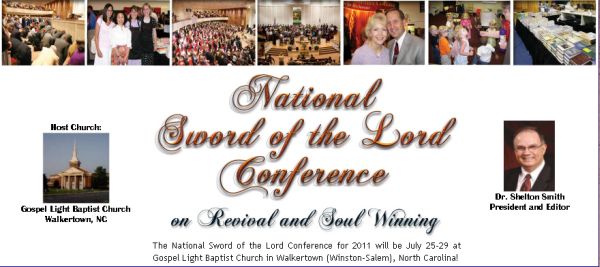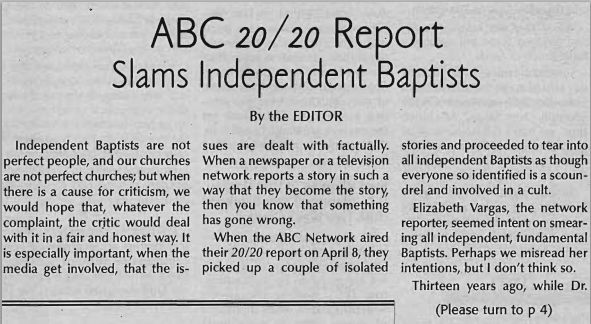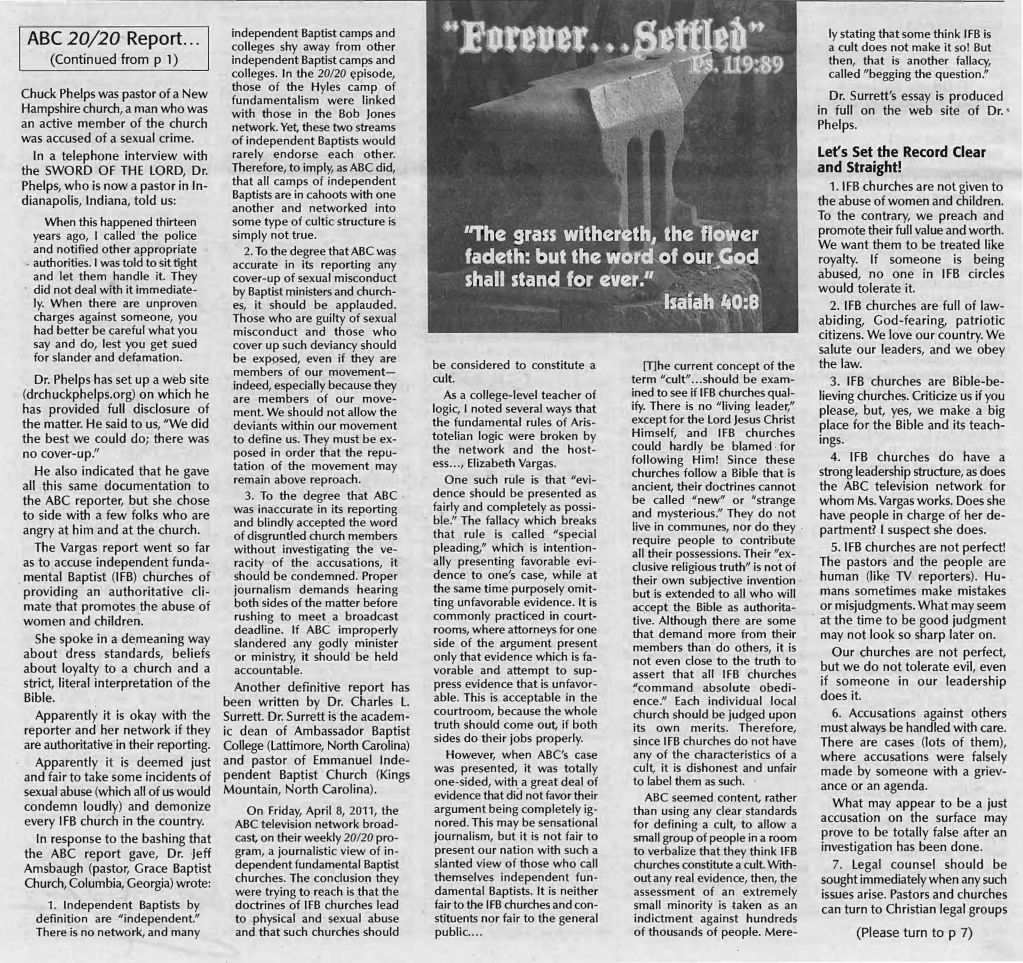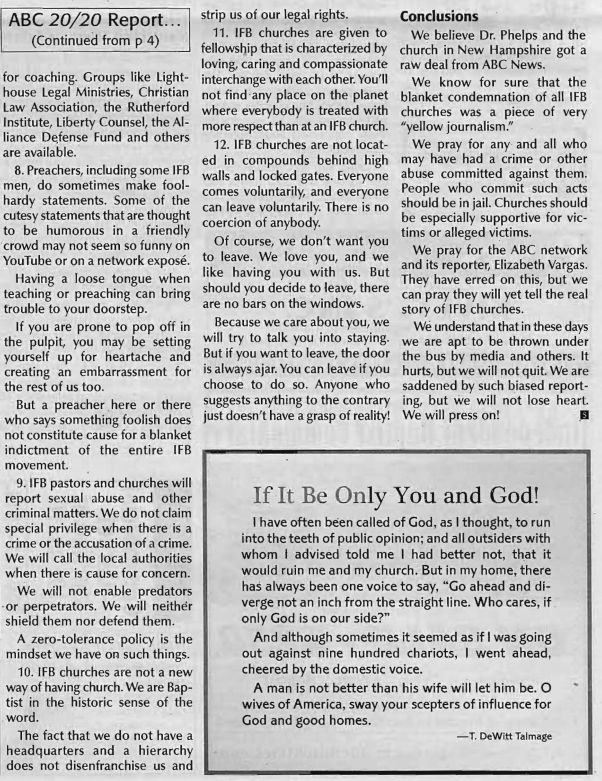
The following is report on the 2010 National Sword of the Lord Conference by an attendee. It is published in its entirety without modification (edit: except the adding of the names of the various session speakers).
My Background:
I come from a nondenominational church on the East Coast. Right now, our church is called a “Fundamental Bible Churchâ€. We are a non-denominational church that uses the New Living Translation. We do not belong to a particular denomination since we prefer to follow our Lord and Savior Jesus Christ. After a messy battle with our previous pastor, we are currently revising our Church Constitution (and looking for a new pastor, too). Unsure as to whether we should issue an invitation to candidate to someone who describes themselves as a “fundamental Baptistâ€, I have been sent to the Sword of the Lord Conference in North Carolina. I am there for the express purpose of finding faults with the conference. After our last pastor, the Board of Elders wants a worst-case scenario report. This will be far from “fair and balanced†reporting.
Monday Evening
The first things that I notice are the huge, ostentatious Bus Ministry signs – as if numbers are a competition. The platform area is raised and features Doric columns and ornate chairs – they remind me of a Greek temple. In this case, the one being adored is the pastor.
The presenter comes to the podium and engages in blatant Hero Worship – He talks about the “great†Dr. Rice, the “great†Gospel Light Baptist Church, and the “great†Sword of the Lordâ€. It takes over five minutes before anyone says anything about God or Jesus, and even then they fail to call Him “greatâ€. The Presenter then goes on to say that “We will be using the same Bible as last year.†This is greeted with shouts, whistles, and Amens. He then goes on to say that “we will be using†the same complete, perfect, and infallible Bible as people have been using for over 400 years. I take pity on those using foreign-language bibles and determine to visit the booksellers and see if anyone is really selling a KJV 1611.
The music is LOUD. The speakers seem to be set at full volume, and it hurts. It’s worse than any concert of any variety I’ve ever been to. The tempo and beat of the music reminds me of some contemporary worship, but how can that be – isn’t this a bastion of fundamentalism? I must be missing something. Now the sermons start. There’s a small smattering of applause – are these people really applauding a pastor like he’s some kind of celebrity? Anyway, the sermons have begun. I will leave off the speakers names in order to protect the ignorant. Note: please do not consider these to be authoritative lists of stupidity. They are only the ones I could remember after the service, since all the pens seem to have been removed from the auditorium.
Speaker One (Shelton Smith, editor of The Sword Of The Lord) says that America’s problems are ones of repentance. Apparently, only going to the altar shows true repentance and brings revival. His sermon is about the “Amen†speaking – the “Amen†being a name of God. He uses as his text the passage in Revelation talking about the Laodicean church. (Rev 3:16) He says that the “angel†of the church is really the pastor. Strange, since my Strong’s Concordance says this word means minister and is the same word used to describe Michael and Gabriel. What happened to literally translating Scripture? He then says it’s the pastor’s duty to tell his congregation what the Amen is saying. How is this different from the Pope??? Anyway…
Speaker Two (Evangelist Lou Rossi, Jr.) comes to the stage. I can’t even remember what his sermon is about, but I do remember that part of his message was about how we cannot make doctrines out of things that are not in the Bible. He says that yellow busses, preaching in white shirts, and the order of a church service are all extra-biblical things and are only personal preferences, not signs of “rightness†with God. In almost the same breath, he says that when people want to “mess with this (holding up a KJV Bible), then it’s preaching time. He claims that the KJV is the only Bible and all others are fakes. (Please try telling this to the French, German, and Spanish….) He goes on to say that if a church is not KJV only, then it is not a church at all but is instead involved in mysticism and controlled by Babylon.
At another point is his message, Speaker Two complains that men have become effeminate, and blames – of all things – Trading Spaces. He says that the problem comes from “men watching Trading Spaces with their wives – especially that guy with the green hat.†This begs the question: How does he know about the green hat?? He says that men need to go back to being “real†men – men with no feelings. He proclaims that men should be able to say: “Slap me and I don’t feel a thing – I’m dead.†I guess we should also stop treating women with respect….
Speaker Two also blamed the hippies for today’s societal problems and denounced all forms of psychiatry and counseling unless it came directly from the KJV.
A phrase I have grown weary of hearing is, “Can I get an AMEN?!?â€. Seriously, if you have to ask, you probably don’t deserve one. It’s especially annoying when it’s asked every 15 seconds. Apparently, a plague will come upon you if you don’t AMEN every time a preacher mentions some Super-Fundy He-Man.
Tuesday Morning
The preachers are treated like celebrities. The applause is LOUD and raucous when they are introduced. How is honoring a man bringing glory to God?
I can’t remember a thing about Speaker One’s (Tim Rabon, pastor of the Beacon Baptist Church in Raleigh, NC) message, other than he said that Paul was executed vial guillotine. Can everyone say “anachronism� Sometime during his message, he started crying. I guess he missed Mr. No-Heart’s message last night… After he spoke, Speaker One came off the stage only to be greeted by his adoring fans. He walked through the front rows of three sections shaking hands and hugging people. Who does he think he is, taking the glory from God?
Speaker Two (Clyde Box, retired pastor) didn’t even preach. He spent his entire allotted time engaging in Hero Worship. He talked on and on and on about Rice, Hynes, Seitler, and Roloff. I thought about Roloff – should we really be worshiping a guy who essentially killed himself by his own stupidity? Speaker Two also asked all the pastors over 70 to stand, and then literally screamed at the audience, telling them to honor those standing and those already departed – apparently this can be accomplished through soul-winning. And here I thought that soul-winning was to bring glory to God. Glad he straightened me out! He tried to tie in his Hero Sermon with Psalm 45:8, saying that the smells mentioned there are referring to God’s glory, suffering, and healing powers. The Altar Call was to ask God that we “smell the acacia of his healingâ€. I’m pretty sure he meant that we should go out and win souls, but if that doesn’t sound mystical I don’t know what does. He also urged people to ask forgiveness for not honoring old preachers.
Tuesday Afternoon
I went to the Sword of the Lord tables this afternoon and asked for a KJV 1611. They said the table was full of them. I looked around, and then asked where they were. I was told that they were right in front of me. I pointed out that their KJV Bibles were written in modern English and, therefore, could not be the KJV 1611. I also did this at another, smaller KJV-only bookseller. If fundamentalists are going to proclaim themselves KJV-1611, then they’d better stop lying and start doing it! On another note, in my travels among the booths, I saw a sign proclaiming “2,000 Years of Baptist Historyâ€. I must go back to that stall and have a chat with them…
Tuesday Evening
Speaker One’s (Kevin Folger, pastor of the Cleveland Baptist Church in Cleveland, OH) message was on the “due order†of God. He seemed to use this as a springboard to preach against whatever he felt like. He said that CCM was utterly devoid of doctrine and had no spiritual value. It’s obvious that he hasn’t listened to any. He also preached against women looking like men and men looking like women. However, he never really defined any of his terms, but simply stated his personal opinions as if they were divinely inspired from God.
Speaker Two (Paul Chappell, pastor of the Lancaster Baptist Church in Lancaster, CA) had a great message about listening and being filled with the Holy Ghost. The only thing I could find against his message was that he constantly referred to the present time as “The Laodicean Church Ageâ€. How do we know that the seven churches of Revelation are ages of the church and not simply seven kinds of churches? I guess since he believes in seven church ages, there must be seven church ages.
After the service I found the “2,000 Years of Baptist History†people and had a nice discussion with them. They seem to apply the term “Baptist†to anyone that has held similar beliefs throughout history. Since the author is a Ph.D., he must be right. I guess I’m wrong for assuming that since the Baptist denomination began in the 1800s, then there were no Baptists before them. Some people need a basic history lesson: something cannot exist before its creation.
I am still unable to find a KJV 1611.
Wednesday Morning
Speaker One (Evangelist John Bishop) was great. I have nothing to say against him. He preached an excellent message on dealing with difficult times.
Speaker Two (Max Barton, pastor of the People’s Baptist Church in Greenville, NC) started with praise for Dr. Smith, the Smith Family, Dr. Rice, and Dr. Hyles. He then launched into his sermon, tied loosely to Psalm 80 (or perhaps it was 85). He dealt with the problems of America – apparently television being one of the most grievous sins of the past century. Second to television was America’s cultural abandonment of her so-called Christian heritage. Never mind the fact that many of the persons quoted were Masons (secret societies are frowned upon by Fundamentalists), Deists, or Agnostics. Since they mention God in a favorable light, they must be OK.
Speaker Two then expounded on the problems with “modern†preaching. He mentioned two problems. The first problem – no surprise here – is the fact that preachers are not using the KJV. Those that do not use the KJV are doomed to fail because they are not backed by the power of God found in the Authorized Version. Apparently fundamentalists have never read the preface to the KJV, which clearly states that (1) The KJV was authorized by King James and not God, and (2) that the purpose of the KJV was to advance the Church of England. I doubt that many fundamentalists would say the Church of England was ever a “Christian†church. The second problem with modern preachers is their use of PowerPoint. He never said exactly what the problem with PowerPoint is, he just said that his lack of PowerPoint knowledge somehow disqualified him from preaching….go figure.
Wednesday Evening
Talk about Hero Worship: Speaker One (Bobby Roberson, pastor of the Gospel Light Baptist Church in Walkertown, NC) was greeted with thunderous applause and a standing ovation. He then proceeded to spend his allotted time just talking without spending much time in the Bible. He talked about how great his church was, how great his bus ministry was, how great his Spanish ministry was, and how great his school was. He also talked about Hyles, Sightler, and Roloff. After each anecdote, he would attribute praise to God. However, it seemed to me like he was just blowing his own horn. What about all the churches that cannot do those kinds of ministries? Does that make them inferior? For a “Revival and Soul Winning Conference,†it had little to do with either.
Speaker Two (R. B. Oullette, pastor of the First Baptist Church of Bridgeport, MI) used as his text the passage talking about the prophet of God who went astray and was killed by a lion. He used this as a springboard to encourage the audience to “keep on the right path.†I’ve tried to remember the things he talked about, but please do not consider this to be a complete list. Throughout this sermon there were constant AMENs, yells, hand waving, et cetera.
Preached Against: John MacArthur, Rick Warren and his wife, Charles Shuler, drinking, dancing, Hollywood, movies, television, CCM, non-KJV Bibles (the NIV is especially wicked), praise and worship bands, modesty (which was never really definedâ€, DVDs, radio, the Southern Baptist Convention, and everything that had anything non-fundamentalist about it.
Preached For: The Sword of the Lord, the KJV, the Old Paths, “good†music, and everything that Fundamentalism has stood for since it began.
Surprises: He said he was not against facial hair or the non-wearing of ties as long as no other doctrines were compromised.
Thursday Morning
Speaker One (Raymond Barber, pastor emeritus of the Worth Baptist Church in Ft. Worth, TX) and Two (Mike Allison, pastor of the Madison Baptist Church in Madison, AL) were essentially the same = America would fall into moral and economic ruin unless everyone adheres to Fundamentalist beliefs.
Thursday Night
Speaker One (Jeff Amsbaugh, pastor of the Grace Baptist Church in Columbus, GA) preached a great message on power of God
Speaker Two (Norris Belcher, pastor of the Church Of The Open Door in Westminster, MD) preached about Hezekiah breaking brass serpent of Moses. This guy was anti-everything. I think this guy managed to fit in everything fundies hate; I couldn’t even keep up with a list. I remember him saying we should worship people like MacArthur and Warren, but didn’t say anything about the Hero Worship of the Pastors/Special Music that had gone on the entire week. He said that things shouldn’t be kept around because of how old they were or if that’s the way our ancestors did it. (Wait, don’t they use those arguments FOR the KJV? I guess it doesn’t apply here). Essentially, this guy was saying that unless we followed all the tenets of Fundamentalism, we were living in idolatry.
Friday
Cut my visit short. I can’t take it anymore.
[ for the record this means that he missed:
1. Mike Norris, pastor of the Franklin Road Baptist Church in Murfreesboro, TN
2. Jeff Fugate, pastor of the Clays Mill Road Baptist Church in Lexington, KY
3. Sam Davison, pastor emeritus of the Southwest Baptist Church in Oklahoma
City, OK
4. Joe Arthur, pastor of the Harvest Baptist Tabernacle in Jonesboro, GA]
I will recommend to the Board of Elders that we screen carefully anyone calling himself a “fundamental Baptistâ€. In addition, I will suggest that we drop the word “Fundamental†from the name of our church.
Are you going to be attending a fundamentalist event? Reports from the front lines are always welcome at SFL. Anonymity guaranteed.






